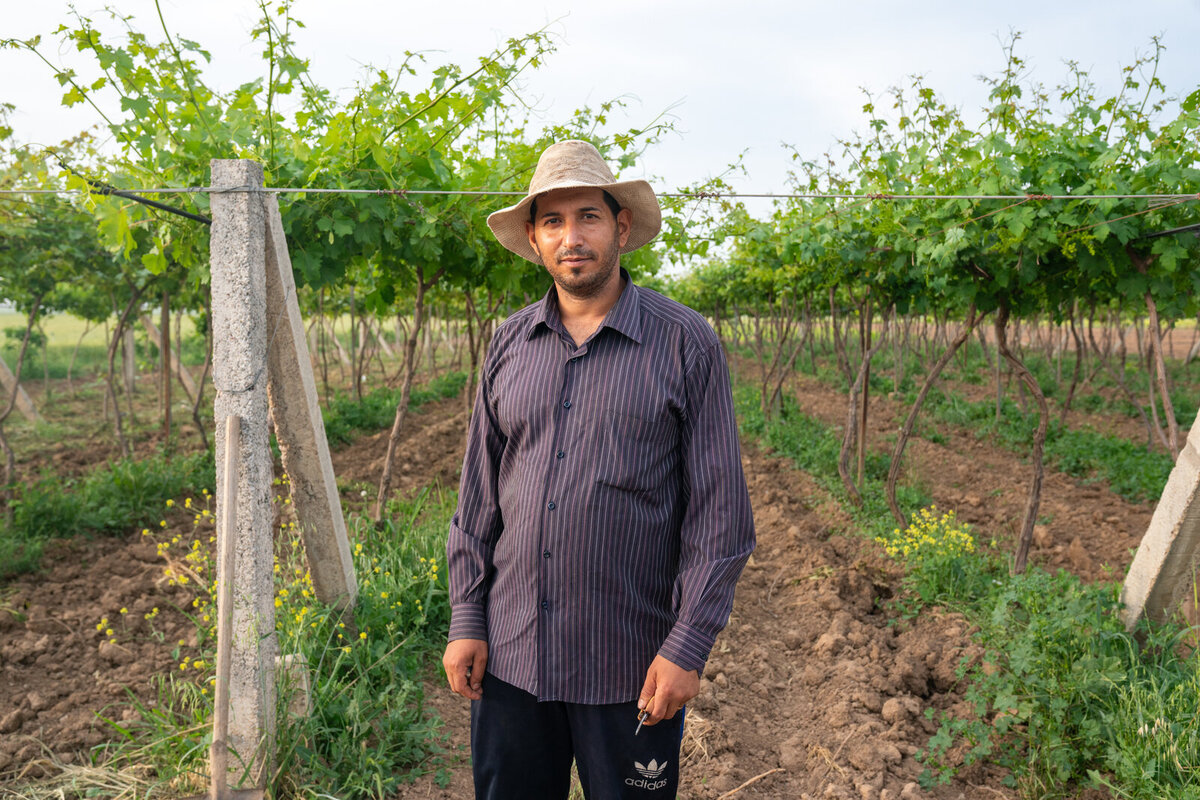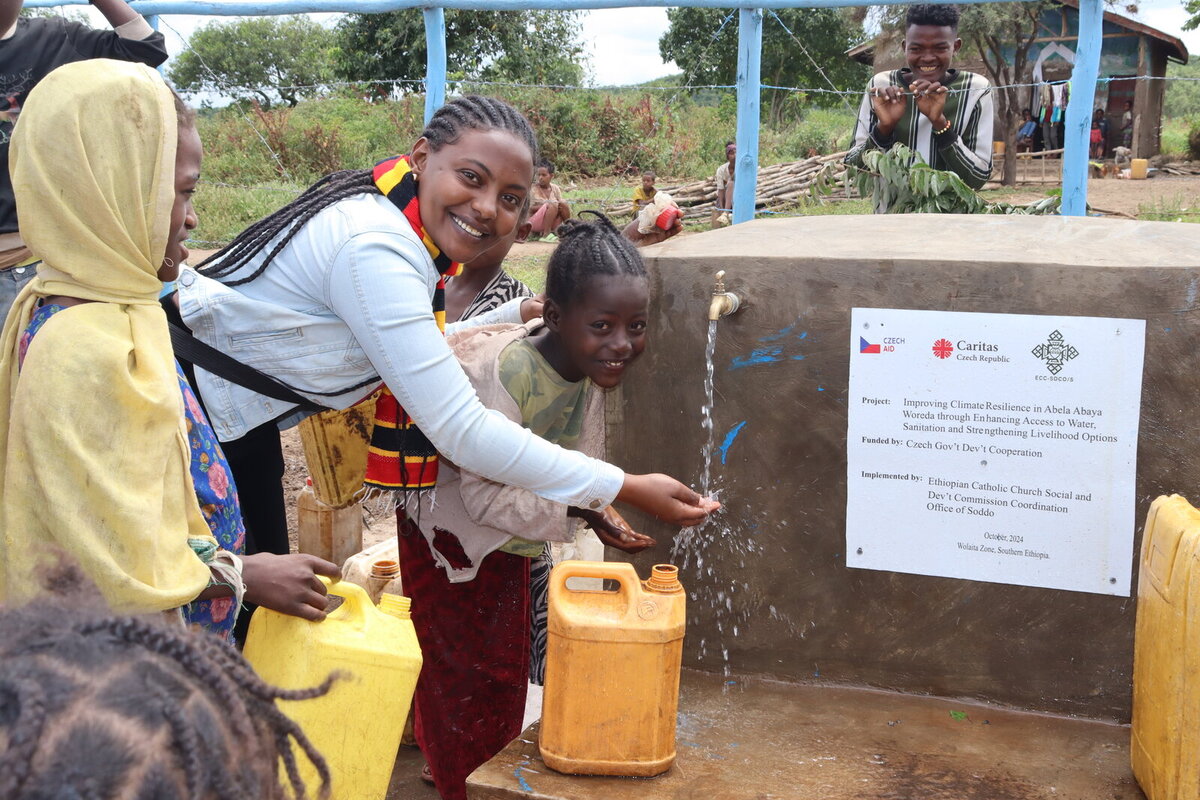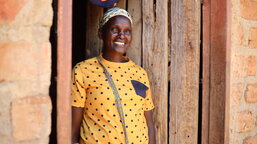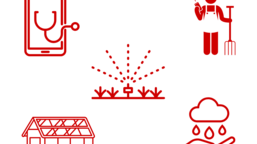Drought, polluted water, failed crops. For many of the communities that we support, the effects of climate change are part of everyday life. That is why our humanitarian and development work increasingly focuses on protecting the environment and building climate resilience. We provide training for farmers, improve access to water, support innovative solutions, and deliver aid that does not burden nature. Here is what that looks like in practice.
1. Helping farmers adapt to drought
In many rural areas, people rely on what they grow themselves. But changing weather patterns, prolonged droughts, and soil degradation threaten their livelihoods. Caritas Czech Republic supports smallholder farmers in adapting to changing climate conditions by offering training in modern, sustainable farming practices, introducing drought-resistant seeds, and promoting water-efficient irrigation systems.
In Iraq’s Nineveh Governorate, for example, we equipped farmers with a modern irrigation system. Farmer Waseem says: “Climate change is destroying our crops. Caritas Czech Republic is helping us adapt.”
In Zambia, we support farmers like Conceptor, whose harvests are increasingly impacted by climate change. “Climate change has had a serious impact on many of my crops. Because of extreme drought, I only harvested a small amount, just enough to feed my family,” she recalls. After taking part in Caritas Czech Republic's training, her harvests improved significantly. “I no longer need to buy food, because my crops now feed the whole family,” Conceptor says happily.
2. Providing access to water through innovation
When clean water is unavailable, it affects health, hygiene, and food production. In many areas where Caritas Czech Republic works, water is either inaccessible or polluted. We support smart solutions that help save, purify, and make water accessible – especially for the most vulnerable.
We also work sustainably with water in Moldova, where shortages are particularly problematic in rural areas. Caritas Czech Republic introduces an innovative solution to help local schools and kindergartens collect, store, and reuse rainwater.
In Georgia, Caritas Czech Republic focuses on improving wastewater management – reducing pollution and improving water quality for local communities. In rural areas, we installed a biological wastewater treatment plant based on microorganisms that ensure only clean water is released into the environment.
In Ethiopia, we helped over 4,500 people gain access to clean water through newly built or repaired sources. “I used to walk three hours to fetch water. Now we have it right in our village,” says Almaz from southeastern Ethiopia.
3. Providing trainings on environmental protection and climate adaptation
Material aid alone is not enough. That is why Caritas Czech Republic works long-term with communities to strengthen their knowledge and skills for protecting the environment and adapting to new conditions.
We organise training sessions on sustainable soil and water management, organic farming, and responsible use of natural resources. These sessions help communities face climate variability with greater confidence and self-reliance.
“Thanks to the training, I learned when and how to start the season, how to care for the soil and irrigate properly to grow healthy crops,” says farmer Jibran from Iraq. “I’m deeply grateful to Caritas Czech Republic for their support. I always mention Caritas Czech Republic in my prayers and appreciate how they are helping us,” he adds.
4. Acting responsibly – with respect for the environment
We keep the environment in mind in everything we do – choosing long-term, sustainable solutions that are gentle on nature. We work with local resources, promote nature-based technologies, and aim to minimise the environmental impact of our aid.
In water management, agriculture, and resilience-building, we seek approaches that leave no ecological footprint. Environmentally friendly aid also has a greater chance of success – as it draws on local knowledge and real-world possibilities.
In Zambia, for instance, we provide communities with solar dryers – an efficient and eco-friendly way to extend the shelf life of food. This is especially useful in areas with limited access to refrigeration or frequent power outages, which farmers in Zambia often face. In refugee settlements in Zambia, we also opened food processing centres equipped to help farmers store, process, and prepare their produce for market.
5. Supporting food self-sufficiency
Drought and changing weather patterns put harvests – and food security – at risk. That is why Caritas Czech Republic helps farmers improve their farming practices so they can grow enough food for themselves and their families. “I learned which seed types are drought-resistant and how to store my crops to keep them longer,” says Mwiba after attending Caritas Czech Republic training. “Now we have food on the table three times a day. I’m very thankful to Caritas Czech Republic,” says the Zambian farmer.
Aid that supports people and protects nature
At Caritas Czech Republic, we understand that climate change is one of today’s greatest challenges. But we also know that if we empower local communities to adapt, the future can be more resilient – and more just. We work to ensure people have access to water, food, and opportunities.













